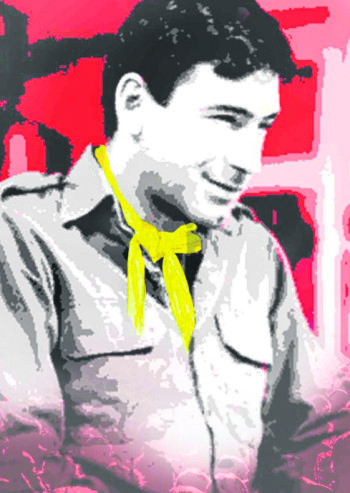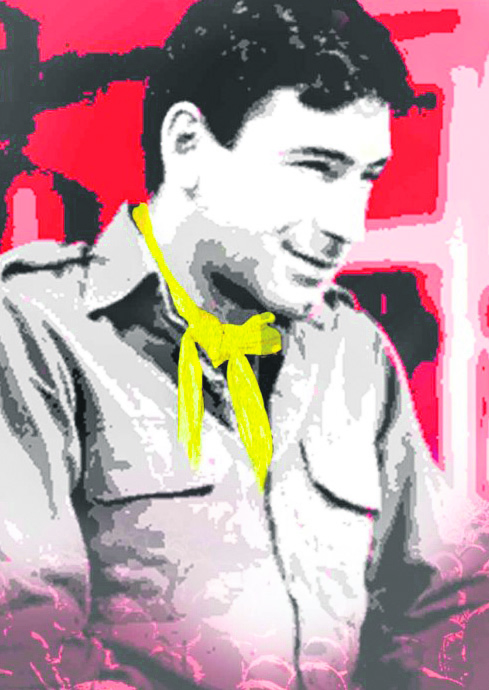In this probing play, Brother Daniel, the choices made by an imprisoned elder of an unidentified revolution and a young lawyer who wishes to save him, may be less heroic than they seem. Or are they?

Brother Daniel (a very convincing Adam Hatzimanolis), a sobriquet, whose real name we never learn, is a revolutionary Everyman. His name, given in his case for less than creditable reasons, is characteristic of revolutionary men: Lenin, Stalin, Ho Chi Minh. In a photograph of his younger days, a rakish Brother Daniel, sports a scarf as did Ernesto “Che” Guevara, and like Che, and several of Chekhov’s philosophical pre-revolutionaries, he is a doctor.
Like other revolutionaries, Brother Daniel ponders the crucial question of prolonging revolutionary fervour for change after the initial overthrow has occurred. The pragmatic and often comical guard (David Attrill) remembers only the 14 hours of heady celebration following victory but almost at retirement he looks back upon his life; a constant struggle to make ends meet. Daniel’s cellmate, Tony (an impressive Vincent Adriano), a murderer and rapist, cheerfully attributes his ability to commit crimes to his education provided by the revolution. The innocent 15-year-old Rhema (Naomi Livingstone) is 15 years old and pregnant, as it turns out, to a corrupt official. The revolution’s achievements are not remarkable.
Brother Daniel, it seems, envisioned revolution as the means of creating a better future for all. Daniel’s aim had been other than to create a new privileged class, represented by Jonathan (Errol Henderson), former companion-at-arms, who sits in as an observer at torture sessions intended to push Daniel into compliance. While disillusioned, it seems, with the failure of the revolution to achieve egalitarian goals, Daniel refuses to allow himself to become the battle standard for university students rebelling against the privileged group he himself helped create. As a consequence Daniel becomes of crucial importance to both groups. The oligarchy pressures him to deny giving support to the new insurgents’ cause and the new rebels, represented by Lucinda (Mel Dodge), daughter of another of Daniel’s former compadres, need Daniel to endorse their own program.
When Daniel refuses both options, the resourceful and determined Lucinda
tricks Daniel into a legal defense. However, Lucinda’s apparent dedication is revealed as having a more personal motivation than the pursuit of fraternity and equality. Moreover, Daniel’s determination not to be re-invented by either side compels him to reveal his reasons for preferring, perhaps even seeking, imprisonment and torture. Are we disillusioned in him? Or does he become more personally worthy, if less of a revolutionary hero?
A thought provoking play, Brother Daniel explores the ambiguity of human behaviour. Jonathan can recall memories of the most meaningful days of his life with genuine relish and at the same time leave Daniel alone with the sadistic Richard (Richard Hillier). Tony can mock Daniel mercilessly yet he is willing to swap his precious cigarettes for painkillers to give him. Daniel and the guard can forget their opposite roles of prisoner and turnkey and be engaged in a genuine moment of dependent patient and compassionate doctor. Lucinda might use Rhema and her mother but she does have concern for Rhema’s future. Rhema’s mother might allow herself to be used but she does have regret for betraying Daniel. It is impossible, as a consequence, to feel that there is a last word to be said on any major human event.
The play was effectively staged. The set (Rachel Scane) was appropriate and unsettlingly claustrophobic. The small space was economically divided into a cell and a boarding house bedroom, props were used persuasively to convey the threatening, brutal nature of the prison, and the deprived, poverty-stricken life of the community. The action of the play was well supported by lighting (Larry Kelly) and the whole smoothly managed (Mark Banks). Overall, a stimulating and insightful piece of writing in which the play of ideas is energised by intelligent performances and the coherent direction of Travis Green.





